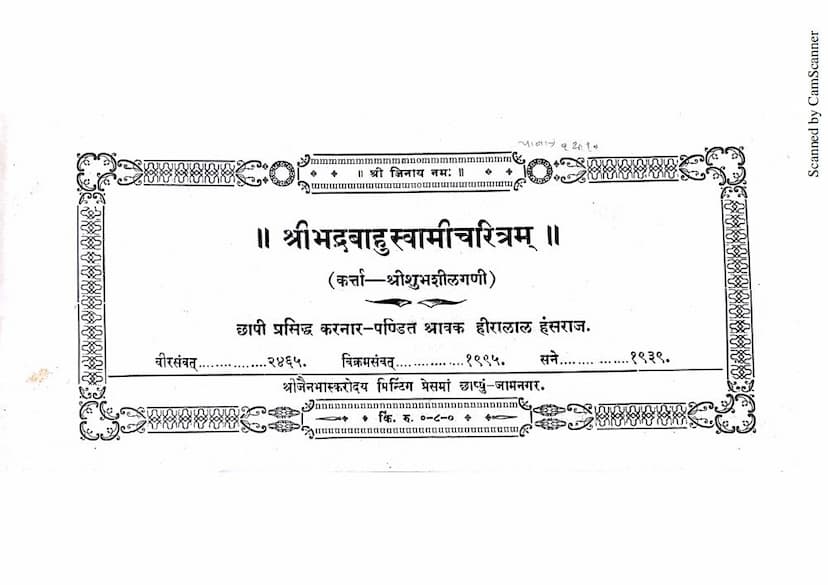Bhadrabahuswami Charitra
Added to library: September 1, 2025

Summary
Here is a comprehensive summary of the "Bhadrabahuswami Charitra" by Shubhshil Gani, based on the provided text:
The "Bhadrabahuswami Charitra" (The Life Story of Acharya Bhadrabahu) is a Jain text authored by Shubhshil Gani and published by Shravak Hiralal Hansraj.
The narrative begins by introducing two impoverished Brahmin brothers, Bhadrabahu and Varaha, who resided in Pratishthanpur. They lived in extreme poverty, struggling to survive. Upon hearing a sermon from the esteemed Acharya Yashobhadra, who preached about the impermanence of the world and the importance of following the Jinendra's teachings (Jain Dharma), both brothers were deeply moved. They reflected on their dire circumstances, realizing that wealth dictates status, knowledge, and respect in society. Convinced that their current life offered no worldly pleasure, they decided to embrace asceticism (sanyama) and sought initiation from Acharya Yashobhadra.
Through diligent study, Bhadrabahu became a great scholar, mastering numerous Jain scriptures and composing commentaries (yuktis) on important texts like Dashavaikalika, Uttaradhyayana, Dashashrutaskandha, Kalpa, Vyavahara, Avasyaka, Suryaprajnapati, Sutrakritanga, Acharanga, and Rishibhashita. He also excelled in Jyotisha Shastra (astrology), composing a significant work called "Bhadrabahu Samhita."
Meanwhile, Varaha, though also learned, was consumed by pride. This arrogance prevented him from receiving the title of Acharya (Suripada) from their guru. When Varaha sought the Acharya title from his brother Bhadrabahu, Bhadrabahu pointed out his pride as the impediment. Unwilling to relinquish his ego, Varaha abandoned his ascetic vows, reverted to his Brahminical attire, and began practicing astrology, creating a new text called "Varahisanhita." He gained renown by making predictions, boasting of his astrological prowess and even fabricating a story about receiving divine knowledge from the Sun God.
Varaha's inflated reputation led to him being appointed as the royal priest by King Jitashatru of Pratishthanpur. However, his arrogance led him to criticize Jainism and its practices. The local Jain community, distressed by Varaha's denigration of their faith, invited Acharya Bhadrabahu to their city.
A significant event occurred when the king's son was born. The king, overjoyed, summoned Varaha to cast the horoscope. Varaha predicted a long and fortunate life for the child. However, Acharya Bhadrabahu, when questioned by the king, foretold that the prince would die within seven days in a specific manner, attributing the prediction to his deep knowledge of astrology derived from the scriptures. Varaha, deeply offended and trying to discredit Bhadrabahu, convinced the king that Bhadrabahu's prophecy was flawed.
On the predicted day, the king took extensive precautions, removing all cats from the palace, as Varaha had suggested the child would die due to a cat. However, tragically, the child died in the predicted manner, not directly by a cat, but by a falling door bolt which was described as having a "cat-like mouth" or a feline characteristic. The people then condemned Varaha and praised Bhadrabahu for his accurate, albeit differently interpreted, prediction.
Varaha, humiliated and condemned, attempted to discard his astrological texts but was stopped by Bhadrabahu, who explained the truth of the scriptures and the importance of proper understanding and the lineage of teaching. Bhadrabahu attributed Varaha's error to his ego and lack of true knowledge.
Later, Varaha, seeking to regain his prestige, made another prediction in the royal court: that fifty-two palas of fish would fall from the sky during a sudden rain shower. Bhadrabahu corrected this, stating that fifty-one palas of fish would fall to the east of the assembly hall. As predicted by Bhadrabahu, the fish fell exactly as he described, solidifying the king's faith in Jainism and earning Bhadrabahu immense respect. Humiliated, Varaha left the kingdom and eventually embraced a heterodox (Bhagavati) initiation, continuing to harbor animosity towards Jain monks.
In his next life, Varaha was reborn as a celestial being (Vyantero) who, due to his past animosity, sought to trouble the Jain community. He manifested as a disease that afflicted the lay followers. When the community appealed to Acharya Bhadrabahu for help, he composed the "Shri Upasarga Hara Stotra" (a hymn for removing calamities). He assured them that reciting this stotra would overcome all diseases and that devotion to it would even appease the celestial being Dharanendra.
While the stotra was effective, Dharanendra himself approached Acharya Bhadrabahu and requested that one stanza be removed, as it was too directly related to his own powers. Bhadrabahu complied, but the stotra, even with the modification, continued to be a powerful aid in overcoming obstacles.
The text concludes by stating that Acharya Bhadrabahu, as one of the fourteen Purvadharas, lived a long life, guided many beings towards liberation, and ultimately attained heaven, destined for future liberation.
In essence, the "Bhadrabahuswami Charitra" highlights the virtues of humility, sincere devotion to Jain principles, and the power of true knowledge, contrasting them with the downfall that results from pride and ego, as exemplified by the story of Varaha. It also emphasizes the efficacy of Jain practices, scriptures, and mantras in overcoming worldly difficulties.